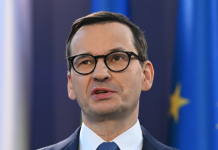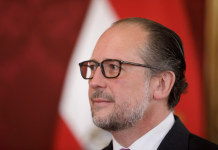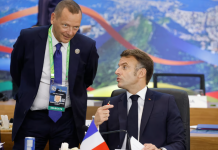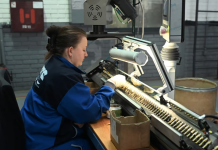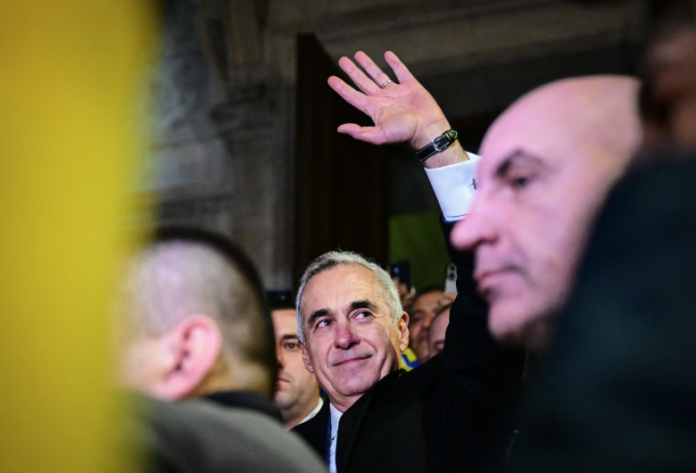
Unless he is banned, ultranationalist Călin Georgescu seems very much in the race to win the presidential election rerun in May.
Romania has set a date to rerun its presidential election after concerns of Russia’s “aggressive hybrid action” first time round, but there’s still a risk the result may be similar at the second attempt and see ultranationalist Călin Georgescu triumph.
The new vote will take place on May 4, with a runoff planned two weeks later, on May 18.
The first round of Romania’s election on Nov. 24 last year triggered international shockwaves thanks to the victory of Georgescu, who was propelled from obscurity by a wildly successful TikTok campaign. The contest was annulled before the second round could take place.
Even though Georgescu’s win — on 23 percent — sparked the panic that ultimately led to the annulment of the vote, he still appears very much in contention for the rerun. Much will now depend on whether he is disqualified by the Constitutional Court because of accusations of undeclared funding.
His continued, and possibly even growing, popularity is partly due to deep suspicion of the cronyism and nepotism of the traditional old parties, who are viewed by many Romanians as pulling strings to annul the first vote.
Georgescu, a vaccine-skeptical maverick who called Russian President Vladimir Putin a patriot and opposes aid to Ukraine, is seen as a threat to Bucharest’s position in the EU and NATO, although he would — to some degree — be held in check by parliament and the government if he were to win.
Declassified intelligence documents alleged that paid influencers, along with members of extremist, right-wing groups and people with ties to organized crime, promoted Georgescu’s candidacy online ahead of Nov. 24.
While the documents said Russia was broadly trying to undermine the election, they didn’t directly state that Moscow specifically swayed Georgescu’s campaign — although they strongly suggested it.
Controversial annulment
Despite this alleged foreign interference, a majority of Romanians still think it was a bad decision to cancel the election, according to a small poll of nearly 1,000 respondents by the Romanian Institute for Evaluation and Strategy, a think tank. Georgescu would have won the runoff if it wasn’t canceled, according to the poll.
In last year’s race, Georgescu had been due to face reformist candidate Elena Lasconi from the center-right Save Romania Union party. She has also criticized the court’s decision to cancel the elections and order a rerun.
Lasconi on Wednesday again accused the leaders of the mainstream parties of trying six times to get her out of the presidential race and vowed to stand again.
“In order to regain our clout as a serious country, we need a serious inquiry into what happened,” said Radu Magdin, a Romanian political analyst, in relation to the first round. Otherwise, it’s very hard for people to move on, as some parties in the governing coalition would like to, Magdin said.

Georgescu has unsuccessfully appealed the Constitutional Court annulment decision domestically and has also lodged a complaint to the European Court of Human Rights.
“It’s been a month and we still don’t have any clear reason for the election cancellation; there has been no proof of involvement by any state actor or any other actor to justify the events we’re witnessing,” said a spokesperson for Georgescu.
He’s called on Romanians to sign a petition to the Constitutional Court asking for the runoff — in which he was due to face Lasconi — to finally take place.
“Georgescu has had the opportunity to cast himself as the victim in front of his electorate,” Magdin said.
This sense that he is being pushed aside by the old order will only be amplified if the Constitutional Court decides he’s ineligible to stand for election again over irregularities in his first presidential campaign last year.
Romanian prosecutors last month raided properties of a key Georgescu backer as part of an investigation focused on money laundering, bribing voters and computer fraud. According to the declassified intelligence files, the backer had provided €1 million for Georgescu’s campaign, of which TikTok said it received €360,000.
Georgescu has rejected accusations of not declaring campaign funds, saying his success was due to the Romanian people rather than a behind-the-scenes social media campaign.
Growing popularity?
Since November, Georgescu’s profile has boomed and he remains the favorite for May’s election, according to a poll commissioned by Bucharest Mayor Nicușor Dan, who is also running for president.
That poll showed at least 40 percent of Romanians plan to vote for Georgescu, Dan told Digi24, without specifying how many people were polled.
“The frustrations he channels as a candidate, the anti-system vibe as well as his promises for the future, cannot be easily matched by another candidate,” Magdin said.
But Victor Ponta, a Social Democrat member of the Romanian Parliament, and a former prime minister, suggested the mayor’s poll was fictitious.
“You don’t run polls over the holidays — it’s an invention — Mr. Dan didn’t even specify the name of the so-called polling company,” Ponta told POLITICO.
The leaders of Romania’s governing coalition parties — the Social Democratic Party, the National Liberal Party, the Hungarian minority party and representatives of other ethnic minorities — also confirmed Wednesday that former National Liberal Party leader Crin Antonescu was their common candidate for the presidential election.
Antonescu, who is married to former EU Transport Commissioner Adina Vălean, is a former Senate leader. He ran for president unsuccessfully in 2009 but hasn’t held any political position over the past decade. Ponta, his former ally, called him “the most representative for the [Romanian] political system of the last 30 years.”
But that’s exactly what Romanians rejected in the first round of the cancelled presidential election last year, when none of the representatives of the mainstream parties made it into the runoff.
Magdin argued it was hard to find a candidate whom Romanians know well enough and who could stand up to Georgescu.
“Antonescu’s profile, yes, you can say it’s a bit of an oldie, but he can also be a goldie, because he has been a little bit more romantic than the local political average and he is good in terms of delivering speeches, which you can’t say about a lot of the opponents that Mr. Georgescu may face in the second round,” Magdin said.
Antonescu could not be immediately reached for comment.
Approaching the second vote, Romania’s mainstream political parties need to explain to voters the dangers of the extremist trend that Georgescu personifies, and the difference between the European model, based on the rule of law, and the Russian model, based on violence, said Siegfried Mureșan, a member of the European Parliament from the National Liberal Party.

